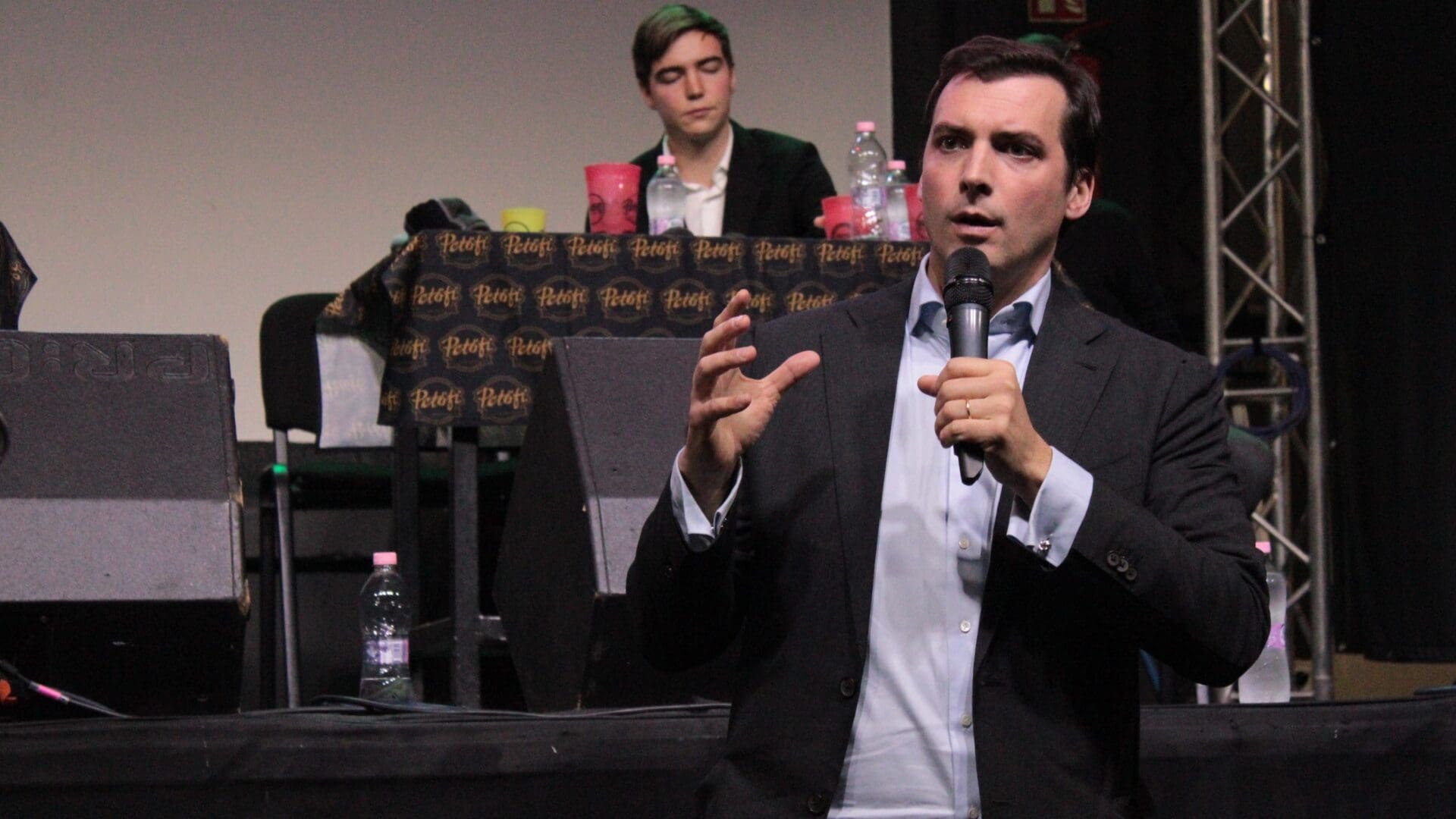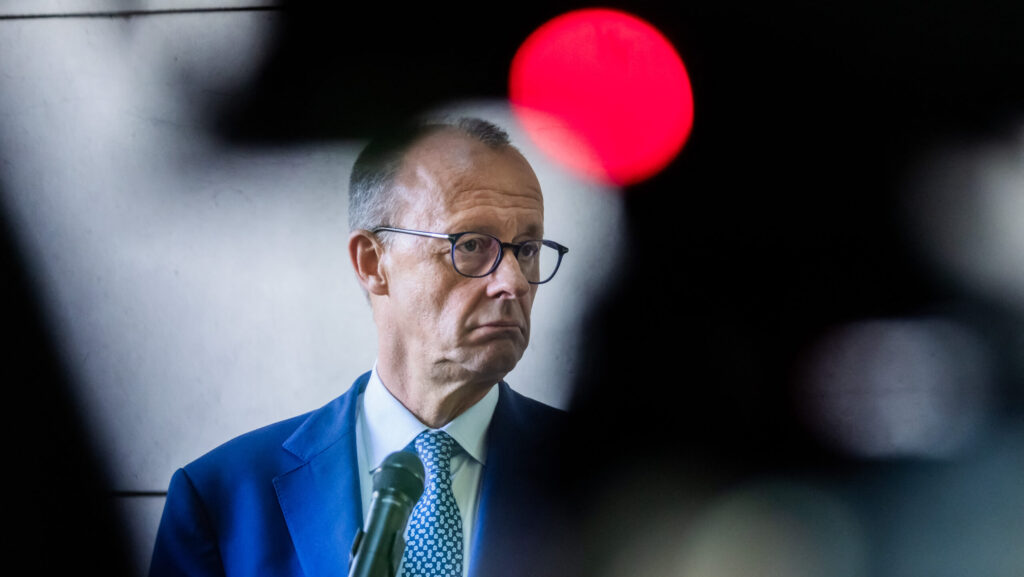In the debut of this interview series across the lines of partisan politics and personalities, Wael Taji speaks with Thierry Baudet—the fiery Dutchman who established his place in the political landscape as a contrarian persona even prior to the COVID pandemic. Since then, Baudet’s perspectives have shifted further in the direction of political scepticism; both toward the political authorities in the Netherlands and the EU, but also toward the media and information authorities writ large. In this interview, Taji explores the thought and philosophy of Baudet regarding the Russo-Ukrainian War, the EU, migration, and our historical narratives in the European continent. The interview was recorded in Budapest after Mr Baudet spent several hours signing copies of the recently released Hungarian version of his book titled The Covid Conspiracy.
***
First things first: Mr Baudet, welcome to Budapest. What’s your first impression of the city?
Well, it’s not exactly my first rodeo. I’ve been here many times, but it’s always delightful to be in Budapest. There’s a wonderful 19th century atmosphere to this city, and frankly speaking, it yields a ‘vibe’ of sorts that I find very touching, familiar even. And needless to say, it’s always a pleasure to be able to meet a readership in a different language than one’s own.
You’ve met this morning with some of your fans here in Budapest, to sign copies of your latest book The Covid Conspiracy, which is now available in Hungarian translation for the first time. Bouncing off the topic of your recent work, I want to ask you for your thoughts on so-called ‘COVID amnesia’. It seems to some of us as though we’ve been sleepwalking into 2024 with a sort of collective forgetfulness, wherein both the left and right are increasingly reluctant to even discuss, let alone remember, the shocking instances of governmental overreach we saw during the pandemic just a few years ago. What are your thoughts on this ‘collective COVID amnesia’ we seem to be suffering from? Why is it happening, and why are you fighting against it?
Because during COVID we could see exactly what we were dealing with—the beast let itself be watched in the mouth, as a Dutch idiom has it; I’m sure there’s a version of it in Hungarian. People find that very uncomfortable. We saw, to give just one example, massive corporations make billions of euros, and/or dollars, of scammy quasi-medicines.
Governments are very willing to increase control, to lie about the implication of policies, to implement censorship, to implement ridiculous regulations, And that’s a very unpleasant realization. And people don’t want to confront this reality. They don’t want to live in a world that doesn’t conform to their most basic, most fundamental assumptions—not just those assumptions about human nature being inherently good, but those other assumptions which are more tricky to tackle.
And those assumptions are these: that government takes care of us. That the ‘truth’ is inexplicably but ultimately digested from the discourse that takes place within the arena of public debate. That big corporations, and indeed even pharmaceutical corporations, are like doctors insofar as they exist to help us and take care of our health. It’s very, very scary, to imagine living in a tyranny ruled by these assumptions, with no power to challenge them—as we experienced during COVID.
There does seem to be reluctance among the general population to confront uncomfortable truths, which, as you said, challenge their worldviews, or their basic assumptions. You mentioned the unquestioning confidence in government, but might I ask: is it perhaps more fundamental than that? What do you think about the notion that many people in the western world don’t want to believe in the idea of evil? That we’ve lost the ability to understand that people can be bad actors, institutions can be bad actors, governments can even be bad actors? Do you think that somehow, and for some reason or reasons, we in this 21st century cultural milieu that we find ourselves in, are unable to come to terms with the very concept of evil?
No, I don’t think so because there is a lot of demonization going on all the time against people like me, but also against Putin’s Russia, against all the enemies of the moment. There are ‘enemies’ of liberalism, who find themselves vilified to an extreme extent, and they are depicted as the absolute evil. There’s also this whole mythology that has been created around the Second World War, where there was absolute evil, and then the absolute good of the allies, and so on. So, I think there is actually a lot of belief in evil, but it’s a belief that is targeted in specific ways for specific ends, and perhaps that’s what you’re hinting at.
The evil that is perceived in our current time is the evil of those that are holding back the march of history. That’s also why the full title of Karl Popper’s book, Open Society and its Enemies, is so important.
Open Society liberalism always needs enemies. This is because it’s ultimately the ideology of permanent revolution. So the enemy is there, the enemy is evil, and that, I think that is your point. The enemy is not within, as it was in the traditional Christian sense, or indeed in the classical sense, but it’s out there. It’s actors that are acting in bad faith. They know they’re evil. They know that they are restraining [the march of] history, and therefore, it cannot be the case that they genuinely have a different opinion about things, about the inherently conflicting nature of men, which would, in a different understanding, lead us to tolerance.
So in short, there are bad faith actors—and they are all bad faith actors. And therefore, censorship, to give just one example of a punitive measure that contradicts the rights we claim to uphold, is entirely legitimate. And therefore, as we see with our own eyes unlimited warfare against Russia is entirely legitimate. Such is our current structure.
Those who have different ideas on these questions can be, and are, simply dismissed. Often, we dumb this down to the level of ludicrousness. Dissidents are just in it for the money. They just crave attention. They were, and are, (and that is one of the things that I find predominant in the West right now with this quasi-totalitarian mindset where there is a single truth) opposed to the inherent goodness of the march of history. We all know that that’s where we’re ultimately going to end up—a good future, because now is always bad, and tomorrow is always perfect. And anyone who poses question marks or has a different idea of what life should be like, or how life should be organized, and what life should be about, is an enemy of the open; he is an enemy of history, and therefore he must be eradicated.
Carl Schmitt, the German jurist and political philosopher, wrote a book called The Concept of the Political, which is mandatory reading for all undergraduate students of politics at Cambridge University. At least, this is how it was when I was a student at Cambridge. In his book, Schmidt posits the necessity of the existential enemy, the opposition against which the ‘self’ is organized on political lines. Your last answers drew heavily upon geopolitical topics, past and present. Going from this, could you perhaps give your thoughts on how, geopolitically speaking, we in the West have constructed for ourselves our own Schmittian ‘existential enemies’—both in the present, and in our past. In previous talks, you have hinted that the financing of what some call a ‘forever war’ against Russia in the theatre of Eastern Ukraine might constitute a misallocation of resources. To put it more simply, you argue that maybe we aren’t assessing the good and the bad, or the salience and significance of various historical ‘good’ and ‘bad episodes, in the way that we should be. Building off of this viewpoint you espouse, what other candidates do you think might be more legitimately classified as existential enemies to Western civilization, in this Schmittian conceptualization?
Okay. So first, a short note on Schmitt, because I think he is often misunderstood. How I view his little book about the definition of political action is as an attempt to describe the realm of politics. And the way I understand him is as such: he distinguishes, for example, between the aesthetic realm, which is about beauty and ugliness, versus the ethical realm, which is about good and evil.
And thirdly, there is then the political realm, which is about forming a team, which is about us and them, any us and any them. And therefore, in my view, Schmidt can be read more as a Realpolitik realist than as an eschatologist who talks about existential enemies that must be eradicated in the absolute sense.
I think Schmitt allows very much for the possibility that you have shifting alliances. There are no enemies or friends in foreign politics or in politics in general. There are simply interests that are sometimes aligned and sometimes not aligned. And building up from that general remark, I think we currently live in an age that is very eschatological, which derives from liberalism, which was also one of Schmitt’s ideological opponents.
Our current enemy, of course, is defined by anything that is identified as fascist.
And the definition of fascist is, was, given by the Frankfurt School, by their understanding of what happened in the Second World War, which was ultimately, in their view, the confrontation between traditional Europe embodied by Nazi Germany, and minorities, which were most vividly represented by the Jews. And I think that understanding of the Second World War and of European identity is just flawed—it does not sufficiently dignify the victims, nor comprehend the perpetrators, of the atrocities that happened within a century from where we are right now.
I think that’s not what fascism is. That’s not what the Second World War was primarily about. And I think we have to rid ourselves of the fundamental cultural Marxist idea that we must destroy European identity at its very fundamentals. That we must destroy the classical nuclear family. We must destroy nations. We must destroy classical aesthetics. We must destroy the Christian faith.
That’s wrong. That’s the problem. But, because every institution and every intellectual circle,
every cultural aspect of our lives has been infected almost completely with the categories of cultural Marxism
since the Frankfurt school; this is the dominant frame that has become the vocabulary for everyone. It has become so implicit in everything that we do, that even the vast majority of conservatives are incapable of escaping from it.
To make it more political, it’s the embodiment of this enemy, this existential enemy, which is ultimately always related to, and ultimately always brings back, the Second World War. And the perception of the Second World War that was created by the Frankfurt School is of course, anything that’s traditionally, or identifiably, Europe. And the obvious leader of traditional Europe is Vladimir Putin. Russia is the largest and most traditional European country on the planet as of 2024. And Putin is unfortunately very outspoken. But (laughs) someone else who ends up on this leftist graph is, of course, Viktor Orbán; someone who is not quite as Nazi as Putin, but is somewhere in that direction, according to the dialectic I have described.
I think we need to rid ourselves entirely of that vocabulary, from that way of thinking, from that mono-dimensional equation. You’re 100 per cent anti-fascist, or you’re a complete fascist. And that, that’s the spectrum.
A bipolar, societal dialectic.
Yeah. And that’s what we need to free ourselves from.
Thank you for that. Let’s move now toward the topic of culture. Now, we are speaking here in Budapest, which is a city that’s rapidly changing. Many of my Hungarian friends and colleagues regard Budapest to be no longer, strictly speaking, a Hungarian city. It’s very common to go inside shops and meet with people who don’t speak Hungarian at all. Ubiquitous are the encounters one has with individuals who, surprisingly, appear to be living and working here without any handicaps, yet do not even speak the language of the land itself. Personally speaking, as a foreigner and an immigrant who is working hard to study and learn Hungarian, I sometimes find myself wondering: who are these people, and why are they even here? This sense of profound societal confusion and Durkheimian anomie is one that, in Hungary at least, is relatively new—perhaps it can even be reversed. But in Western Europe, where you and I grew up, it is significantly more advanced. As a politician hailing from the Netherlands, what lessons do you think you can convey from the Dutch experience? And what should we avoid getting wrong?
If I understand the question correctly, it’s a very deep one that I’m not sure there is an easy answer to it. Because on the one hand, we are presenting ourselves as self-conscious Europeans in the sense that we do not want to be under the umbrella of America any more. We believe there’s a distinctly European path, which is on the one hand a collective path.
And on the other hand, Europe is obviously composed of nations which are independent entities with their own languages and their own ways of life. And I wouldn’t deny that there’s a paradox there. On the one hand, I want the preservation of the Hungarian nation, for example. But I’m also very, very happy when I encounter Hungarians that speak English, because otherwise there’s not really any hope of a good conversation.
But specifically more on the immigration front; in terms of the Netherlands being much more advanced than Hungary is. What do you think we can learn here in Hungary from the Netherlands in that regard?
Oh—when it comes to immigration is very simple.
What are the lessons you would have for us?
You can very well welcome immigrants that come and bring something in terms of high quality activities. When it comes to lower quality activities that sometimes you might need as a society, you shouldn’t give anyone permanent residency. In principle, there’s not necessarily anything wrong with, for example, bringing in nurses from the Philippines, when you have a problem with an aging population like the Netherlands has.
Yet needless to say, the thing about an aging population is that it’s a temporary phenomenon that will resolve itself by nature. But you might have a couple of years of overlap, or you may find your state budget such that you have a need to bring in people. Well, that’s fine. You can give them, let’s say, a five-year residency. In the meantime, you can pay for some kind of education for them.
And you can pay them enough money so that they can maintain their families back home. And thus, they fly back with great experiences, boom, boom, boom. There’s nothing immoral about this—nothing even remotely questionable on any grounds, moral or legal. What is questionable is to start giving these unskilled immigrants, particularly unskilled migrants, long-term or even permanent residence permits and/or visas when their labour is contingent upon a specific and temporal episode of economic demand. This is, frankly, insane.
That’s a seriously challenging topic in modern political discourse. What are your thoughts on this ‘obsolete immigrant’ socioeconomic class, and how do you think we can best address associated problems like intransigent unemployment?
Remigration. I’m very much in favour of remigration. I don’t think there are a lot of people that are thinking about that seriously. But then it’s arguably how much thinking is being done in politics at all…
Thank you for your time. Would you like to offer any concluding remarks?
I love Hungary (laughs).
You love Hungary. And what would you say to the Hungarian readers who read this?
In your magazine? I’m really sorry about Trianon, but please don’t always bring it up (laughs).








